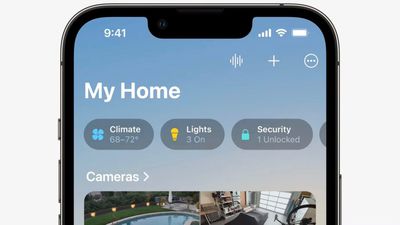iPads Will Work as Home Hubs in iOS 16, But Won't Support New Home Architecture
Though code in iOS 16 has indicated that the iPad won't work as a home hub following the update, an Apple spokesperson today told The Verge that the iPad will indeed still be able to be used as a home hub, but with a caveat - it will not support new architecture that is being introduced later this year.

The spokesperson said that Apple is planning to "introduce a new architecture," which could be referring to Matter, a new smart home standard that will allow for better interoperability between smart home devices from different companies and manufacturers. Apple is expected to introduce Matter support later this year.
iOS 16 and iPadOS 16 will continue to support iPad as a home hub with no loss in functionality. Alongside these releases, the Home app will introduce a new architecture for an even more efficient and reliable experience. Because iPad will not be supported as a home hub with the new architecture, users who rely on iPad for that purpose do not need to update the Home architecture and can continue enjoying all existing features.
Those who use an iPad for their smart home setups will need to avoid updating to the new architecture, which will be available as an upgrade in the Home app's settings in an update to iOS 16 and iPadOS 16. Customers who want to continue using an iPad will need to avoid this future update, which sounds like it is coming in an iOS 16.1 or iOS 16.2 software release.
Apple has already made it clear that iPads will not be compatible with Matter, as the iOS 16 preview page states that Matter accessories rely on an Apple TV 4K or HomePod as a home hub, with no mention of the iPad. So in conclusion, for the time being, the iPad can be used as a home hub, but things are likely to change later this year with future iOS 16 updates.
The Apple TV 4K, Apple TV HD, HomePod, and HomePod mini will all work as home hubs with the new architecture that Apple has in the works.
Popular Stories
The long wait for an Apple Watch Ultra 3 appears to be nearly over, and it is rumored to feature both satellite connectivity and 5G support.
Apple Watch Ultra's existing Night Mode
In his latest Power On newsletter, Bloomberg's Mark Gurman said that the Apple Watch Ultra 3 is on track to launch this year with "significant" new features, including satellite connectivity, which would let you...
The iPhone 17 Pro Max will feature the biggest ever battery in an iPhone, according to the Weibo leaker known as "Instant Digital."
In a new post, the leaker listed the battery capacities of the iPhone 11 Pro Max through to the iPhone 16 Pro Max, and added that the iPhone 17 Pro Max will feature a battery capacity of 5,000mAh:
iPhone 11 Pro Max: 3,969mAh
iPhone 12 Pro Max: 3,687mAh...
Apple's next-generation iPhone 17 Pro and iPhone 17 Pro Max are just over two months away, and there are plenty of rumors about the devices.
Below, we recap key changes rumored for the iPhone 17 Pro models.
Latest Rumors
These rumors surfaced in June and July:Apple logo repositioned: Apple's logo may have a lower position on the back of the iPhone 17 Pro models, compared to previous...
The upcoming iPhone 17 Pro and iPhone 17 Pro Max are rumored to have a slightly different MagSafe magnet layout compared to existing iPhone models, and a leaked photo has offered a closer look at the supposed new design.
The leaker Majin Bu today shared a photo of alleged MagSafe magnet arrays for third-party iPhone 17 Pro cases. On existing iPhone models with MagSafe, the magnets form a...
Apple's position as the dominant force in the global true wireless stereo (TWS) earbud market is expected to continue through 2025, according to Counterpoint Research.
The forecast outlines a 3% year-over-year increase in global TWS unit shipments for 2025, signaling a transition from rapid growth to a more mature phase for the category. While Apple is set to remain the leading brand by...
iOS 26 and iPadOS 26 add a smaller yet useful Wi-Fi feature to iPhones and iPads.
As spotted by Creative Strategies analyst Max Weinbach, sign-in details for captive Wi-Fi networks are now synced across iPhones and iPads running iOS 26 and iPadOS 26. For example, while Weinbach was staying at a Hilton hotel, his iPhone prompted him to fill in Wi-Fi details from his iPad that was already...
Apple today seeded the second betas of upcoming iOS 18.6 and iPadOS 18.6 updates to public beta testers, with the betas coming just a day after Apple provided the betas to developers. Apple has also released a second beta of macOS Sequoia 15.6.
Testers who have signed up for beta updates through Apple's beta site can download iOS 18.6 and iPadOS 18.6 from the Settings app on a compatible...




















